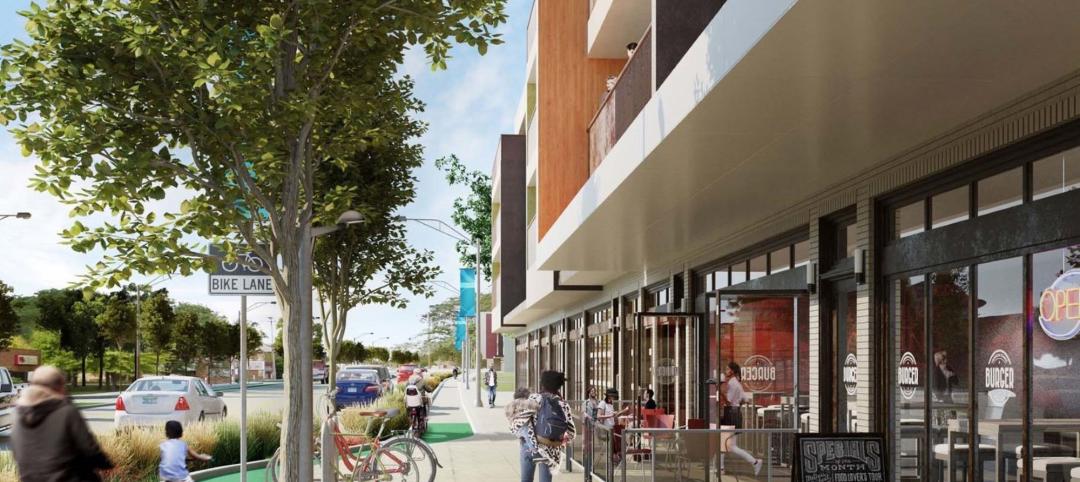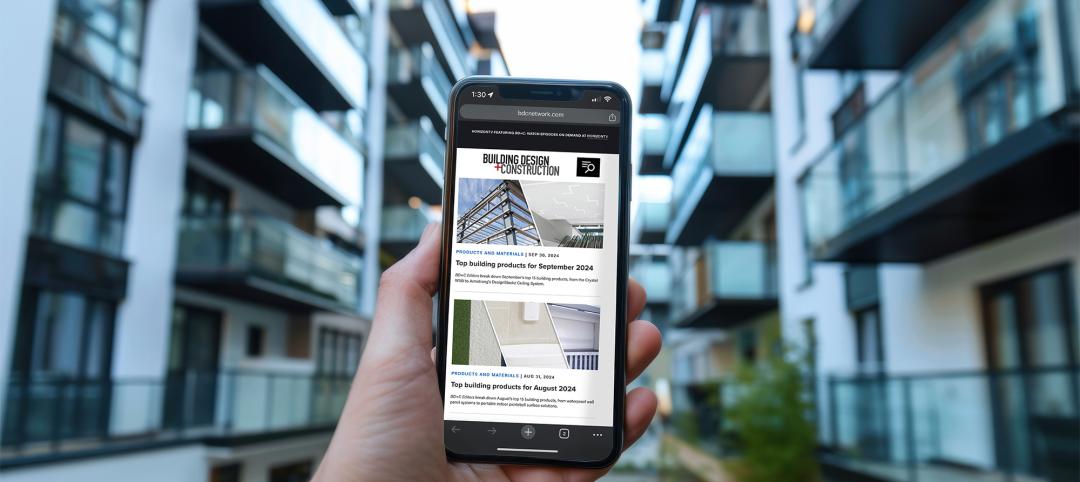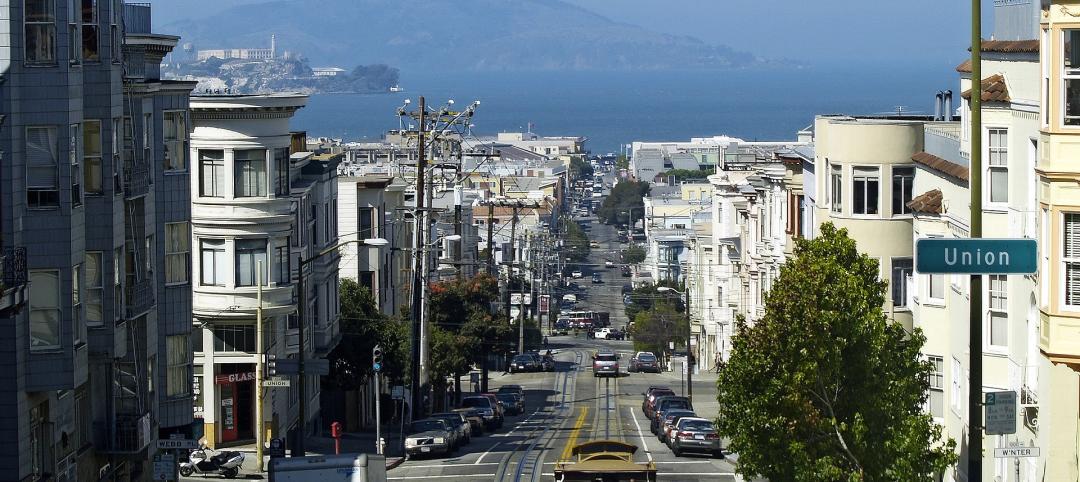Built in 1942, Rose Hill Courts is one of Los Angeles’ oldest public housing complexes. And led by a team that includes the Housing Authority of the City of Los Angeles (HACLA), the developer Related California, and the general contractor R.D. Olson Construction, the first phase of Rose Hill Courts’ redevelopment and expansion is underway to construct two Type V-A four-story wood-frame buildings with 51 and 38 units, respectively, and ground-level surface parking spaces.
Upon completion, this project will nearly double Rose Hill Courts to 185 affordable housing units for low, very low, and extremely low income families, and replace its existing 100 units set on five acres.
The two new buildings in phase one are designed to achieve LEED certification, and their construction is scheduled for completion at the end of next year. Totalling 103,000 sf, the two buildings will offer 51 one-bedroom, 26 two-bedroom, eight three-bedroom, and four four-bedroom apartments. One building will also have a 3,000-sf underground basement that makes use of an adjacent hill.
A GC COMMITTED TO AFFORDABLE HOUSING
R.D. Olson partnered with Withee Malcolm Architects on this project. Resource Environmental Inc., a hazardous material abatement and demolition contractor, performed abatement and demolition work that was completed prior to the financial closing and construction that started in June.
The Rose Hill Courts redevelopment is R.D. Olson’s fourth affordable housing project within a 10-mile radius of Los Angeles. “We bring the right experience along with well-established relationships in the community, and are successfully navigating the challenges of keeping the remaining 70-year-old residences operational during phase one of construction,” says Bill Wilhelm, R.D. Olson’s president.
Also see: L.A.’s component-based interim housing
According to HACLA’s website, phase two of the redevelopment will include 95 affordable apartment homes that target very low and extremely low income residents. Once both phases are completed, the redevelopment will include a 6,300-sf community building with and on-site property management office and social services, and a “Central Park” green space with shaded seating, barbeque grills, courtyards, and children’s play areas with “tot lots” for resident use.
Both phases will feature surface parking, a secured interior bike room, bike racks, entirely new landscaping, lighting, fencing, signage, security features, storm-drain and utility improvements. The new sustainably designed buildings will utilize solar power and the landscaping will include water-efficient irrigation and storm water reuse.
A HOMELESS PROBLEM THAT’S GETTING WORSE
Phase 1 of the redevelopment is financed with $31.8 million in tax-exempt bonds and $13.9 million in private equity raised through the sale of federal low-income housing tax credits. HACLA will provide up to $8.35 million during construction. This phase of redevelopment will also be supported by $15.5 million in funding from the State of California department of Housing and Community Development through the Affordable Housing & Sustainable Communities and Infill Infrastructure Grant programs.
In addition, $8 million in AHSC grant funds were awarded to the City of Los Angeles to provide pedestrian safety upgrades in the immediate neighborhood and improvements in public transportation including six new bus shelters and eight battery electric buses.
The Rose Hill Courts redevelopment is occurring at a time when homelessness in southern California has been rising. On any given night there are more than 66,000 people homeless in Los Angeles County, and 739 homeless died in the county in the first six months of 2021, 20% more than during the same period in 2020. In July, L.A. County approved $527.1 million in funding to battle homelessness in fiscal 2012-22.
Related Stories
MFPRO+ New Projects | Oct 30, 2024
BIG’s One High Line finally reaches completion in New York City’s West Chelsea neighborhood
One High Line, a luxury residential project spanning a full city block in New York’s West Chelsea neighborhood, reached completion this summer following years of delays related to investor lawsuits.
MFPRO+ New Projects | Oct 30, 2024
Luxury waterfront tower in Brooklyn features East River and Manhattan skyline views
Leasing recently began for The Dupont, a 41-story luxury rental property along the Brooklyn, N.Y., waterfront. Located within the 22-acre Greenpoint Landing, where it overlooks the newly constructed Newtown Barge Park, the high-rise features East River and Manhattan skyline views along with 20,000 sf of indoor and outdoor communal space.
Multifamily Housing | Oct 28, 2024
A case for mid-rise: How multifamily housing can reshape our cities
Often referred to as “five-over-ones,” the mid-rise apartment type is typically comprised of five stories of apartments on top of a concrete “podium” of ground-floor retail. The main criticism of the “five-over-one” is that they are often too predictable.
Adaptive Reuse | Oct 22, 2024
Adaptive reuse project transforms 1840s-era mill building into rental housing
A recently opened multifamily property in Lawrence, Mass., is an adaptive reuse of an 1840s-era mill building. Stone Mill Lofts is one of the first all-electric mixed-income multifamily properties in Massachusetts. The all-electric building meets ambitious modern energy codes and stringent National Park Service historic preservation guidelines.
MFPRO+ News | Oct 22, 2024
Project financing tempers robust demand for multifamily housing
AEC Giants with multifamily practices report that the sector has been struggling over the past year, despite the high demand for housing, especially affordable products.
Products and Materials | Oct 17, 2024
5 multifamily tech products for your next project
Multifamily housing and technological upgrades go hand-in-hand. From the rise in electric vehicle charging needs to the sophistication of smart home accessories, tech products are abound in the multifamily space.
Codes and Standards | Oct 16, 2024
North Carolina’s code policies likely worsened damage caused by Hurricane Helene
The North Carolina Legislature’s rejection of building code updates likely worsened the damage caused by Hurricane Helene, code experts say. Over the past 15 years, lawmakers rejected limits on construction on steep slopes, which might have reduced the number of homes destroyed by landslides.
MFPRO+ News | Oct 16, 2024
One-third of young adults say hurricanes like Helene and Milton will impact where they choose to live
Nearly one-third of U.S. residents between 18 and 34 years old say they are reconsidering where they want to move after seeing the damage wrought by Hurricane Helene, according to a Redfin report. About 15% of those over age 35 echoed their younger cohort’s sentiment.
Student Housing | Oct 9, 2024
University of Maryland begins work on $148 million graduate student housing development
The University of Maryland, in partnership with Campus Apartments and Mosaic Development Partners, has broken ground on a $148.75 million graduate student housing project on the university’s flagship College Park campus. The project will add 741 beds in 465 fully furnished apartments.
MFPRO+ News | Oct 9, 2024
San Francisco unveils guidelines to streamline office-to-residential conversions
The San Francisco Department of Building Inspection announced a series of new building code guidelines clarifying adaptive reuse code provisions and exceptions for converting office-to-residential buildings. Developed in response to the Commercial to Residential Adaptive Reuse program established in July 2023, the guidelines aim to increase the viability of converting underutilized office buildings into housing by reducing regulatory barriers in specific zoning districts downtown.

















